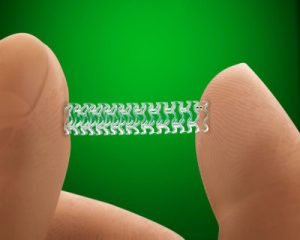- Home
- Editorial
- News
- Practice Guidelines
- Anesthesiology Guidelines
- Cancer Guidelines
- Cardiac Sciences Guidelines
- Critical Care Guidelines
- Dentistry Guidelines
- Dermatology Guidelines
- Diabetes and Endo Guidelines
- Diagnostics Guidelines
- ENT Guidelines
- Featured Practice Guidelines
- Gastroenterology Guidelines
- Geriatrics Guidelines
- Medicine Guidelines
- Nephrology Guidelines
- Neurosciences Guidelines
- Obs and Gynae Guidelines
- Ophthalmology Guidelines
- Orthopaedics Guidelines
- Paediatrics Guidelines
- Psychiatry Guidelines
- Pulmonology Guidelines
- Radiology Guidelines
- Surgery Guidelines
- Urology Guidelines
First in human of new polymer-free stent demonstrates favorable angiographic, imaging-based outcomes at nine-months

A first-in-human study of a new polymer-free drug-filled stent, which provides controlled drug elution from an internal lumen, indicated non-inferior in-stent late lumen loss at nine-months compared with historical zotarolimus-eluting stent (Resolute) data. In addition, there was no binary restenosis, and a high degree of early stent strut coverage with minimal malapposition.
Findings from the REVELUTION study were reported at the 28th annual Transcatheter Cardiovascular Therapeutics (TCT) scientific symposium. Sponsored by the Cardiovascular Research Foundation (CRF), TCT is the world's premier educational meeting specializing in interventional cardiovascular medicine. The study was also published simultaneously in JACC: Cardiovascular Interventions.
A polymer-free metal surface stent that is capable of controlled antiproliferative drug elution may avoid the adverse effects of polymer-induced inflammation, thrombosis and non-uniformity, and could potentially allow for shorter durations of dual antiplatelet therapy. The polymer-free drug-filled stent (DFS) used in the study was designed to provide controlled and sustained drug elution from an internal stent lumen without a polymer coating. The DFS is made from a tri-layered continuous wire with an outer cobalt chromium layer, a middle tantalum layer, and an inner lumen coated with sirolimus. Small laser-drilled holes on the abluminal stent surface control drug elution.
The study enrolled 100 patients with de novo coronary lesions 2.25-3.50 mm in diameter and length ≤ 27 mm in two 50-patient cohorts for angiographic, intravascular ultrasound, and clinical assessment at nine or 24 months, with optical coherence tomography (OCT) performed in a subset of 30 patients at multiple time periods. The primary endpoint was angiographic in-stent late lumen loss at nine months compared with historical data from the zotarolimus-eluting stent (Resolute) as a control. Fifty patients with 56 lesions were treated with DFS in the nine-month cohort. Researchers found in-stent late lumen loss was 0.26±0.28 mm for DFS and 0.36±0.52 mm for Resolute (Pnoninferiority<0.001). The
binary angiographic restenosis rate was 0%. Median stent strut coverage by OCT was 91.4%, 95.6%, and 99.1% at one, three, and nine months, respectively. One non-Q-wave myocardial infarction occurred, with a nine-month target lesion failure rate of 2.1%. No stent thrombosis occurred.
"At nine months, the polymer-free drug-filled stent (DFS) was safe and effective with high rates of early strut coverage and non-inferior late lumen loss compared with historical Resolute data," said Stephen G. Worthley, MBBS, PhD, Chief Medical Officer of GenesisCare in Alexandria, Australia. "This polymer-free stent may avoid polymer-associated adverse vascular responses potentially allowing for a shorter duration of dual antiplatelet therapy. However, larger controlled studies with long-term follow-up are required to demonstrate whether the favorable properties of DFS translate into improved event-free survival in patients with coronary artery disease."

Disclaimer: This site is primarily intended for healthcare professionals. Any content/information on this website does not replace the advice of medical and/or health professionals and should not be construed as medical/diagnostic advice/endorsement or prescription. Use of this site is subject to our terms of use, privacy policy, advertisement policy. © 2020 Minerva Medical Treatment Pvt Ltd